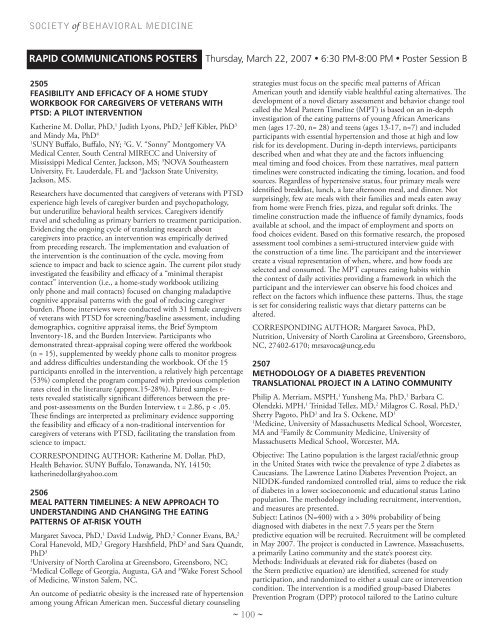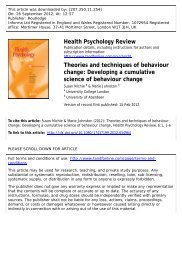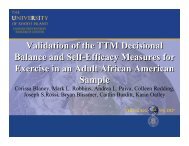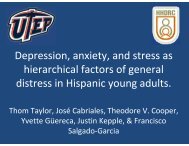2007 Final Program - Society of Behavioral Medicine
2007 Final Program - Society of Behavioral Medicine
2007 Final Program - Society of Behavioral Medicine
You also want an ePaper? Increase the reach of your titles
YUMPU automatically turns print PDFs into web optimized ePapers that Google loves.
SOCIETY <strong>of</strong> BEHAVIORAL MEDICINE<br />
Rapid Communications Posters Thursday, March 22, <strong>2007</strong> • 6:30 PM-8:00 PM • Poster Session B<br />
2505<br />
FEASIBILITY AND EFFICACY OF A HOME STUDY<br />
WORKBOOK FOR CAREGIVERS OF VETERANS WITH<br />
PTSD: A PILOT INTERVENTION<br />
Katherine M. Dollar, PhD, 1 Judith Lyons, PhD, 2 Jeff Kibler, PhD 3<br />
and Mindy Ma, PhD 4<br />
1<br />
SUNY Buffalo, Buffalo, NY; 2 G. V. “Sonny” Montgomery VA<br />
Medical Center, South Central MIRECC and University <strong>of</strong><br />
Mississippi Medical Center, Jackson, MS; 3 NOVA Southeastern<br />
University, Ft. Lauderdale, FL and 4 Jackson State University,<br />
Jackson, MS.<br />
Researchers have documented that caregivers <strong>of</strong> veterans with PTSD<br />
experience high levels <strong>of</strong> caregiver burden and psychopathology,<br />
but underutilize behavioral health services. Caregivers identify<br />
travel and scheduling as primary barriers to treatment participation.<br />
Evidencing the ongoing cycle <strong>of</strong> translating research about<br />
caregivers into practice, an intervention was empirically derived<br />
from preceding research. The implementation and evaluation <strong>of</strong><br />
the intervention is the continuation <strong>of</strong> the cycle, moving from<br />
science to impact and back to science again. The current pilot study<br />
investigated the feasibility and efficacy <strong>of</strong> a “minimal therapist<br />
contact” intervention (i.e., a home-study workbook utilizing<br />
only phone and mail contacts) focused on changing maladaptive<br />
cognitive appraisal patterns with the goal <strong>of</strong> reducing caregiver<br />
burden. Phone interviews were conducted with 31 female caregivers<br />
<strong>of</strong> veterans with PTSD for screening/baseline assessment, including<br />
demographics, cognitive appraisal items, the Brief Symptom<br />
Inventory-18, and the Burden Interview. Participants who<br />
demonstrated threat-appraisal coping were <strong>of</strong>fered the workbook<br />
(n = 15), supplemented by weekly phone calls to monitor progress<br />
and address difficulties understanding the workbook. Of the 15<br />
participants enrolled in the intervention, a relatively high percentage<br />
(53%) completed the program compared with previous completion<br />
rates cited in the literature (approx.15-28%). Paired samples t-<br />
tests revealed statistically significant differences between the preand<br />
post-assessments on the Burden Interview, t = 2.86, p < .05.<br />
These findings are interpreted as preliminary evidence supporting<br />
the feasibility and efficacy <strong>of</strong> a non-traditional intervention for<br />
caregivers <strong>of</strong> veterans with PTSD, facilitating the translation from<br />
science to impact.<br />
CORRESPONDING AUTHOR: Katherine M. Dollar, PhD,<br />
Health Behavior, SUNY Buffalo, Tonawanda, NY, 14150;<br />
katherinedollar@yahoo.com<br />
2506<br />
MEAL PATTERN TIMELINES: A NEW APPROACH TO<br />
UNDERSTANDING AND CHANGING THE EATING<br />
PATTERNS OF AT-RISK YOUTH<br />
Margaret Savoca, PhD, 1 David Ludwig, PhD, 2 Conner Evans, BA, 2<br />
Coral Hanevold, MD, 2 Gregory Harshfield, PhD 2 and Sara Quandt,<br />
PhD 3<br />
1<br />
University <strong>of</strong> North Carolina at Greensboro, Greensboro, NC;<br />
2<br />
Medical College <strong>of</strong> Georgia, Augusta, GA and 3 Wake Forest School<br />
<strong>of</strong> <strong>Medicine</strong>, Winston Salem, NC.<br />
An outcome <strong>of</strong> pediatric obesity is the increased rate <strong>of</strong> hypertension<br />
among young African American men. Successful dietary counseling<br />
~ 100 ~<br />
strategies must focus on the specific meal patterns <strong>of</strong> African<br />
American youth and identify viable healthful eating alternatives. The<br />
development <strong>of</strong> a novel dietary assessment and behavior change tool<br />
called the Meal Pattern Timeline (MPT) is based on an in-depth<br />
investigation <strong>of</strong> the eating patterns <strong>of</strong> young African Americans<br />
men (ages 17-20, n= 28) and teens (ages 13-17, n=7) and included<br />
participants with essential hypertension and those at high and low<br />
risk for its development. During in-depth interviews, participants<br />
described when and what they ate and the factors influencing<br />
meal timing and food choices. From these narratives, meal pattern<br />
timelines were constructed indicating the timing, location, and food<br />
sources. Regardless <strong>of</strong> hypertensive status, four primary meals were<br />
identified breakfast, lunch, a late afternoon meal, and dinner. Not<br />
surprisingly, few ate meals with their families and meals eaten away<br />
from home were French fries, pizza, and regular s<strong>of</strong>t drinks. The<br />
timeline construction made the influence <strong>of</strong> family dynamics, foods<br />
available at school, and the impact <strong>of</strong> employment and sports on<br />
food choices evident. Based on this formative research, the proposed<br />
assessment tool combines a semi-structured interview guide with<br />
the construction <strong>of</strong> a time line. The participant and the interviewer<br />
create a visual representation <strong>of</strong> when, where, and how foods are<br />
selected and consumed. The MPT captures eating habits within<br />
the context <strong>of</strong> daily activities providing a framework in which the<br />
participant and the interviewer can observe his food choices and<br />
reflect on the factors which influence these patterns. Thus, the stage<br />
is set for considering realistic ways that dietary patterns can be<br />
altered.<br />
CORRESPONDING AUTHOR: Margaret Savoca, PhD,<br />
Nutrition, University <strong>of</strong> North Carolina at Greensboro, Greensboro,<br />
NC, 27402-6170; mrsavoca@uncg.edu<br />
2507<br />
METHODOLOGY OF A DIABETES PREVENTION<br />
TRANSLATIONAL PROJECT IN A LATINO COMMUNITY<br />
Philip A. Merriam, MSPH, 1 Yunsheng Ma, PhD, 1 Barbara C.<br />
Olendzki, MPH, 1 Trinidad Tellez, MD, 2 Milagros C. Rosal, PhD, 1<br />
Sherry Pagoto, PhD 1 and Ira S. Ockene, MD 1<br />
1<br />
<strong>Medicine</strong>, University <strong>of</strong> Massachusetts Medical School, Worcester,<br />
MA and 2 Family & Community <strong>Medicine</strong>, University <strong>of</strong><br />
Massachusetts Medical School, Worcester, MA.<br />
Objective: The Latino population is the largest racial/ethnic group<br />
in the United States with twice the prevalence <strong>of</strong> type 2 diabetes as<br />
Caucasians. The Lawrence Latino Diabetes Prevention Project, an<br />
NIDDK-funded randomized controlled trial, aims to reduce the risk<br />
<strong>of</strong> diabetes in a lower socioeconomic and educational status Latino<br />
population. The methodology including recruitment, intervention,<br />
and measures are presented.<br />
Subject: Latinos (N=400) with a > 30% probability <strong>of</strong> being<br />
diagnosed with diabetes in the next 7.5 years per the Stern<br />
predictive equation will be recruited. Recruitment will be completed<br />
in May <strong>2007</strong>. The project is conducted in Lawrence, Massachusetts,<br />
a primarily Latino community and the state’s poorest city.<br />
Methods: Individuals at elevated risk for diabetes (based on<br />
the Stern predictive equation) are identified, screened for study<br />
participation, and randomized to either a usual care or intervention<br />
condition. The intervention is a modified group-based Diabetes<br />
Prevention <strong>Program</strong> (DPP) protocol tailored to the Latino culture

















